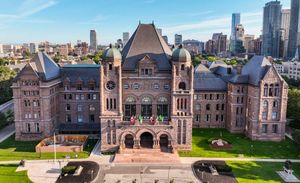Plans to remove the remaining hereditary peers from the House of Lords have made significant strides, though they are on the brink of facing substantial opposition. Introduced as part of the Labour government's commitment to reform, the House of Lords (Hereditary Peers) Bill, which has already cleared the House of Commons, aims to abolish the 92 hereditary seats currently held by individuals who inherit their titles. This move has sparked intense debate, drawing criticism primarily from Conservative peers who label the legislation as divisive and opportunistic.
The bill has been framed as part of Labour Leader Keir Starmer's broader agenda for parliament's modernization. Speaking during the discussions, Baroness Smith of Basildon, Labour's leader in the Lords, addressed the criticisms head-on. She argued against delaying reforms until everything is agreed upon, stating, "To continue to assert wider reforms must be implemented alongside this bill is a willful misinterpretation of the manifesto." The pressing need, according to Smith, is to remove hereditary power from the legislative process, which she described as outdated and unjustifiable.
During the extended second reading debate, which spanned over eight hours and saw contributions from more than 80 speakers, emotions ran high. Critics accused the Labour party of engaging in class warfare, lamenting the impact on the 'wisdom' these hereditary peers purportedly bring to the House. "It is sad to hear the Bill’s arrival be met with applause by some peers. That is not who we are," commented Lord True, the Conservative shadow leader of the Lords. This sentiment echoed throughout the Conservative ranks, positioning their defense of hereditary peers as necessary to maintain not just tradition but also institutional experience.
Adding to the chorus against the bill, former Tory leader of the Lords Lord Strathclyde condemned the measure as “thoroughly nasty,” arguing it was rushed through the House of Commons without adequate consideration of the broader constitutional implications. He maintained it breached earlier agreements negotiated by Tony Blair's government, which allowed some hereditary peers to remain as part of compromise reforms. Strathclyde's rhetoric points to fears within the Tory party about potential future reforms affecting other privileged positions within the House, such as bishops.
This acute discord reflects what's at stake: not just the hereditary peers themselves, but the fundamental nature of the House of Lords as it adapts to modern British governance. Many Conservative peers highlight the need to respect the contributions these life-long members have made to legislative scrutiny. "We are losing much more than just members with this Bill; we are losing institutional memory and wisdom," stated Tory Shadow Cabinet Office Minister Baroness Finn, who argued fervently for the life peerages to be extended to those who wish to continue serving.
Despite the apparent turbulence, supporters of the bill cite a pressing need for reform. The existing structure, they argue, runs counter to contemporary democratic ideals. Reform advocates note the sheer size of the House of Lords, currently housing about 800 members without any restrictions on hereditary titles, compared to the House of Commons, which is limited to 650 MPs. Labour peers suggest reducing membership alongside enhancing participation requirements—a direction they believe will create both accountability and efficiency.
Opposition to the bill also reflects fears about the perception of the House of Lords as being reminiscent of the 'old class' system rather than as a body capable of fostering credibility and meritocracy. Critics assert the issue isn’t just the hereditary peers themselves but what they represent: entrenched privilege contrasted against the backdrop of societal change.
The spotlight on the hereditary peerages is not simply about the individuals affected but questions their legitimacy within the legislative process, with wider calls for transparency and accountability in governance. Some worry this could mark the beginning of larger reforms impacting remaining unelected peers like bishops and others without electoral validation.
Lady Smith responded to the opposition criticisms with confidence, highlighting the ‘overdue’ nature of this current reform. She reiterated the necessity of this step as consistent with Labour's past manifesto pledges, indicating it marks the initial phase of broader changes to come. Her arguments, laced with urgency, suggest those gripping onto tradition may need to reconcile with the incoming tides of reform.
After the extended debate, the bill has now moved forward for detailed scrutiny by the House of Lords, and it is expected to face rigorous examination by peers who feel passionately about the topic. To understand the future of the House of Lords, one must recognize the duality of roles underestimated previously; one of vivid historical significance and another framed by contemporary democratic standards.
Looking at the proceedings, it’s clear the conversation surrounding hereditary peers is part of larger discussions on power dynamics, privilege, and the evolution of British democracy. Will the attempts to remove these hereditary titles lead to meaningful change within the UK's upper chamber? This remains to be seen as the Cabinet and opposition continue to hash out their fundamental disagreements.



